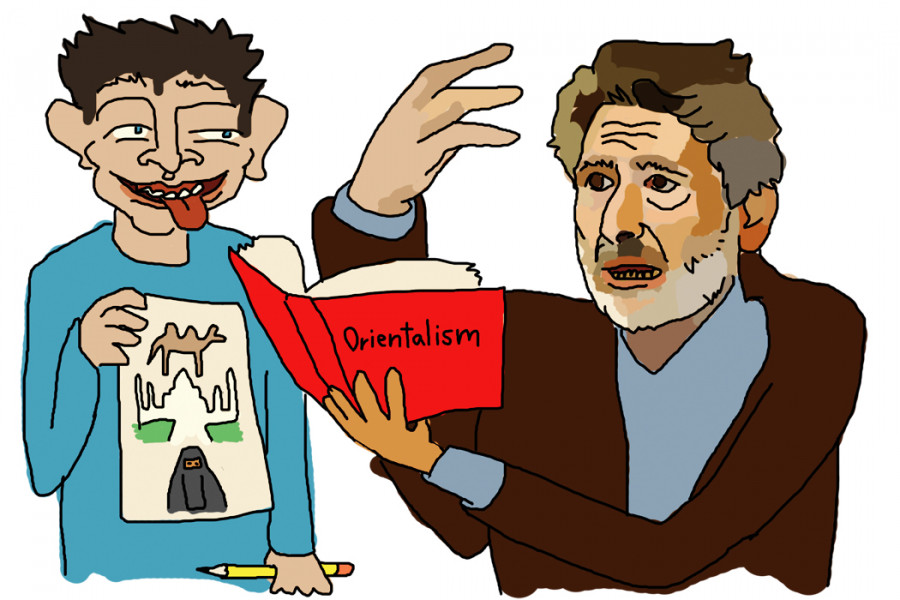Challenging Ethnocentric Visions of Orientalism
Artexte Hosts a Marathon Reading and Workshop on Edward Said
Stemming from a reflection on notions such as the other, post-colonial theory and the politics of representation, Artexte is convening a marathon reading of key works by famous intellectual Edward Said.
Highly influential in the 1970s, Said pioneered the theoretical structure for literary post-colonial studies. With his foundational text Orientalism, published in 1978, Said pointed out the influence of imperialism on cultural politics, denouncing a prejudiced westernized perception of “the East.”
In the light of recent events breaking out on a global scale—the Charlie Hebdo killings in Paris, attacks on mosques across the world, shootings in Denmark and a rising Islamophobic and racist discourse in Europe—the members of Artexte felt the urgency and necessity to address some of the issues circulating around these burgeoning sentiments.
Sarah Watson, general and artistic director at Artexte, underlined the importance and timeliness of this re-reading of Edward Said.
“It’s important for an international city like Montreal to address some of the rising discourse around racism in our city, discourses around new immigration and the rise of racism in Europe at this time, the fear of ‘Islam’ and what all this means. And more directly within the context of art presentation,” she said.
Not only does this initiative challenge our conceptions about the meaning of orientalism in 2015, it also re-evaluates the politics of cultural production as a whole. Why is it important for cultural workers and educators to be conscious of these issues? What role does the artistic sphere play in this geopolitical situation?
The marathon reading day will look at three of Said’s major works. Starting with the first chapter of Out of Place: A Memoir (1999), the readers will then move on to the introduction and chapter one of Orientalism (1978) and finish with the introduction and opening chapter of Culture and Imperialism (1993).
Divided into 15-minute reading segments, the performance is open to anyone who wishes to participate and in any language they wish to. A Google Doodle is available on the website and Artexte’s Facebook page for participants to sign up for a time slot between noon and 9 p.m on March 27.
Adding a live element to the performance was a significant decision. Not only does it underline the critical urgency of the reading, but it also creates a meditative atmosphere—a time and space to bring people together, to create a pause outside of their everyday routine and to stop and think about these issues with the help of intellectuals and critical thinkers.
“Artexte is very much about the documents, the language, the words, the media. And the idea of doing something live struck us as very important,” said Watson.
To follow up on the reading, Artexte has invited two professors in the cultural field to lead a workshop, discussing some of the questions deriving from the re-reading of Said.
Monika Kin Gagnon, a Concordia communications professor and Monia Abdallah, a UQAM professor specializing in contemporary Islamic art and an expert on Said, will lead the discussion, looking at the relationship between post-colonial theory and art—most importantly what place it occupies in the transmission of knowledge.
Watson listed some of the questions rising from discussions between herself, Abdallah and Gagnon that will take centre stage at the workshop.
“How do we talk about art coming from North Africa? How do we talk about it in our schools? How do we teach it? What are the texts that we use now? How can we think otherwise? How can cultural workers have current notions of what it means to talk about post-colonialism and imperialism to students in culture and art now?” Watson told The Link.
The sensitivity around politics of representation underlines the importance of paying close attention to the type of language, imagery, words, sounds etc. that are used to frame a certain culture, especially coming from a colonizing power. Both Gagnon and Abdallah recognize the importance for cultural workers—as producers of content and meaning in society’s written and visual language—to be aware of these questions.
Although the events hosted by Artexte are not aiming to condemn the exhibition on Orientalism happening at the Montreal Museum of Fine Arts, some of the controversy around it further encouraged them to take a closer look at the meaning of Orientalism today.
Among some of the issues related to the representation of “Oriental” culture in the current exhibition at the Montreal Museum of Fine Arts, Watson mentions the oversexualization of the museum’s media campaign.
“It’s one thing to do a retrospective,” she said. “It’s another to call it Orientalism in 2015 without [exploring] what that means within the museum context. Above and beyond that, the exhibition is one thing, but we’re not going after it. Exhibitions like that happen all the time because the type of society we live in produces it.”
Rereading Said: Marathon Reading // Friday, March 27 // 12 p.m. to 9 p.m. // Artexte (2 Ste. Catherine St. E., Room 301) // Free


_600_832_s.png)

_600_375_90_s_c1.jpg)
2_600_375_90_s_c1.jpg)

8_600_375_90_s_c1.jpg)